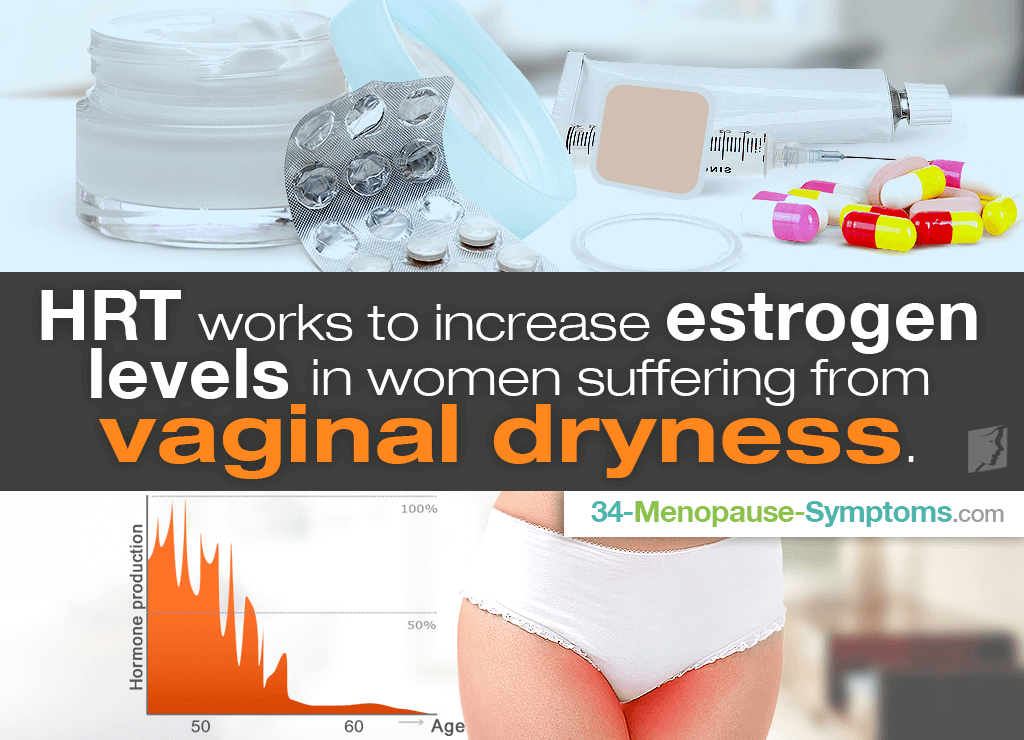Though not life-threatening, vaginal dryness can lead to uncomfortable itching, burning sensations and make sex painful, including bleeding after intercourse. There are a number of treatment options for vaginal dryness, one of which is hormone replacement therapy (HRT).
Continue reading to learn more about how does HRT work for vaginal dryness as well as other treatments available for the menopausal symptom.
What Causes Vaginal Dryness?
Throughout a woman's reproductive life, the mucus membranes in her vagina produce a generous amount of natural, clear lubrication. Those membranes are dependent on healthy amounts of estrogen, a hormone that sends signals for the moisture to be produced.
Around menopause, estrogen production declines as ovarian hormone production comes to a halt with the end of fertility. This estrogen deficiency causes vaginal tissues to shrink and become thinner, causing vaginal dryness and inflammation.
Aside from the menopausal transition, there are various other causes of vaginal dryness as well.
How Does HRT Work to Cure Vaginal Dryness?
In general, HRT works to increase estrogen levels in women who are perimenopausal or postmenopausal. The main cause of the plethora of menopausal symptoms that arise throughout the transition is hormonal imbalance, as the production of both estrogen and progesterone is drastically depleted.
Therefore, those suffering from severe vaginal dryness due to estrogen deficiency are sometimes prescribed estrogen replacement therapy, which introduces exogenous estrogen into the body to fill the hormonal gap.
For vaginal dryness, the most common methods of estrogen administration include vaginal creams and gels; vaginal tablets; or vaginal rings. Other forms of hormone therapy include injections, nasal sprays, and pills, among others.
Are There Any Risks Associated With HRT?
Although HRT provides you with quick relief, the risks of using it may outweigh benefits. Some studies have linked prolonged use of HRT to an elevated risk of developing breast cancer and heart problems in postmenopause; however, more detailed research is needed before we can make sweeping conclusions about side effects of HRT.
It's important to consult a doctor about vaginal dryness and other symptoms to gauge their severity and determine whether HRT is the best option for you.
Are There Any Alternatives?
The best treatments are those that tackle the cause of menopausal vaginal dryness at its source, hormonal imbalance, while having the least side effects.
Phytoestrogenic herbal supplements, such as black cohosh and dong quai, have been traditionally used to treat menopause symptoms, such as vaginal dryness. Also, hormone-regulating supplements, like Macafem, nourish the endocrine glands, stimulating natural hormone production and alleviating symptoms.
Further vaginal dryness treatments include optimizing your diet to include a healthy intake of phytoestrogens as well as incorporating exercise and healthy habits into your daily routine for heightened success.
Key Takeaways
All in all, vaginal dryness is one of the many symptoms of menopause women suffer from due to low estrogen levels. HRT - specifically estrogen replacement therapy - works to increase levels of the hormone in the body, resolving vaginal dryness as well as many other menopausal symptoms. However, long-term risks of pursuing HRT may outweigh its benefits, causing many women to search for more natural alternatives as a solution. No matter your decision, keep in mind that with proper management and the best treatment decided upon mutually by you and your doctor, relief isn't far from reach.
Sources
- MedlinePlus. (2018). Types of hormone therapy | Vaginal Dryness. Retrieved October 4, 2018, from https://medlineplus.gov/ency/patientinstructions/000695.htm | https://medlineplus.gov/ency/article/000892.htm
- National Women's Health Network. (2015). Herbs and Phytoestrogens. Retrieved October 4, 2018, from https://nwhn.org/herbs-and-phytoestrogens/
- NHS. (2016). Types: Hormone replacement therapy (HRT). Retrieved October 4, 2018, from https://www.nhs.uk/conditions/hormone-replacement-therapy-hrt/types/




